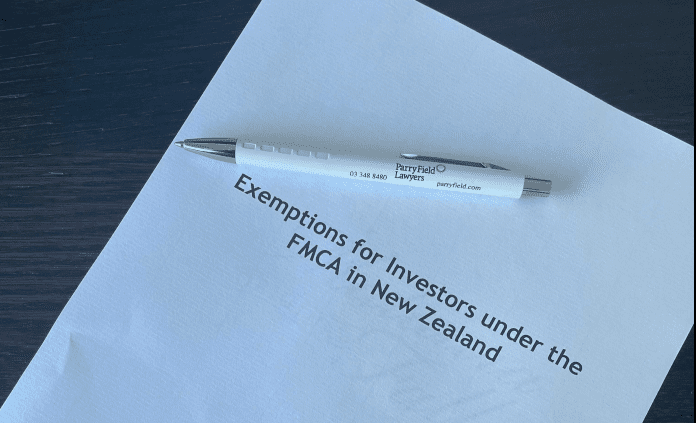The Financial Markets Conduct Act 2013 (“FMCA”) has rules about who can invest when you are issuing debt or equity securities. The basic principle is that any issue of securities (either equity or debt) will require information to be disclosed (in a product disclosure statement) unless you fall within an exemption. A product disclosure statement provides an investor with essential information to help them weigh up the risks of investing.
There are two types of investors that fall within the exemptions:
- People who know enough to already be protected e.g. wealthy enough or know the entrepreneur well enough to have sufficient access to information; or
- The nature of the offer is what provides the exclusion.
These main categories are set out in schedule 1 of the FMA Act here.
Looking at each of the main categories that we see used most often:
- Wholesale investors – includes wealthy or sophisticated people such as people who subscribe for more than $750k; operate an investment business; have assets or turnover of more than $5 million or if a certificate is signed that they are an eligible investor.
- Close Business Associates – this category of people are able to obtain information about the company such as directors, immediate family members, people who already have more than a 5% shareholding in the company etc.
- Employees – if there is a share scheme then it can be used as a category to allow shares to be issued.
- Small offers – an offer to less than 20 people in 12 months and up to $2 million from personal offers can be obtained. A warning statement is needed and you must tell the FMA as well.
- Crowd funding – this is another option but needs to offered through a registered platform. An aggregate limit of $2 million in the last 12 months applies and the monetary limit includes both debt and equity securities as well as any ‘small offers’.
By coming within one of these exemptions you will have less regulations to comply with. We have assisted many investors as well as founders to think through how they will fit within an exemption.
A warning needs to go on the front of documents which looks like this:
“Warning
You are being offered [name of financial product type (for example, ordinary shares)] in [name of issuer].
New Zealand law normally requires people who offer financial products to give information to investors before they invest. This requires those offering financial products to have disclosed information that is important for investors to make an informed decision.
The usual rules do not apply to this offer because it is a small offer. As a result, you may not be given all the information usually required. You will also have fewer other legal protections for this investment.
Ask questions, read all documents carefully, and seek independent financial advice before committing yourself.”
If you would like to discuss this you can contact Steven Moe stevenmoe@parryfield.com or Michael Belay michaelbelay@parryfield.com at Parry Field Lawyers.




